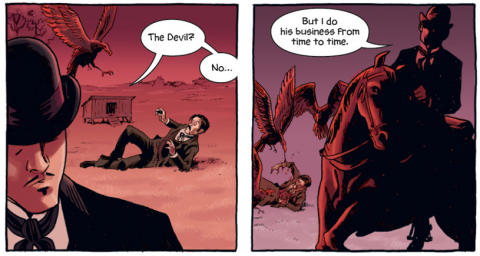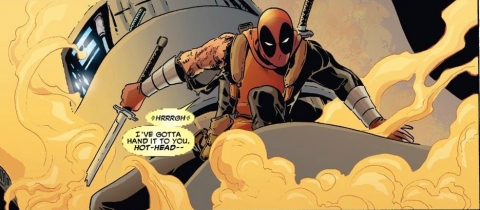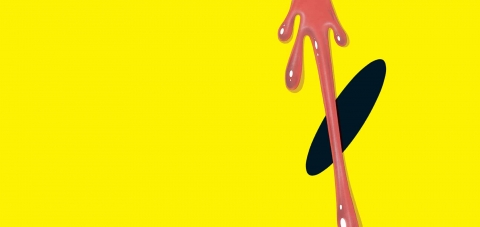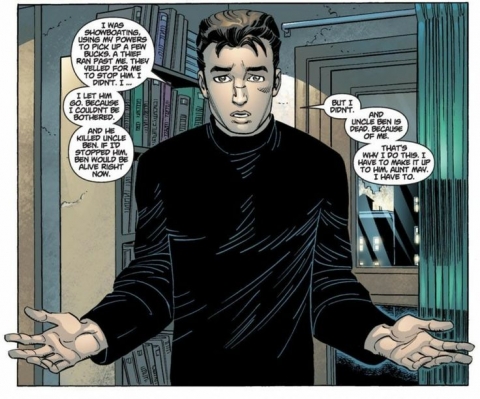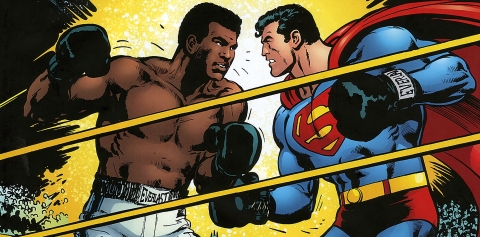52 weeks. 52 different writers. 2 trade paperbacks or hardcovers a week. Each week I’ll take a look at a different writer and read two different collected editions from within that person’s repertoire to help in the examination of their work.
Cullen Bunn first started to emerge in the comic industry back in 2007, creating the horror noir series The Damned for Oni Press. This was the earliest collaboration of Bunn and artist Brian Hurtt, who is a frequent contributor on their current Oni Press series, The Sixth Gun, which began back in 2010 and still runs strong today. Together the two have been mainstays with Oni Press for years, although Bunn has now rose in prominence and creates monthly comics for major publishers like Marvel and DC Comics. Cullen Bunn currently works on so many different series for multiple publishers that he’s often referred to as “one of the hardest working men in comics”.
The Sixth Gun Volume 1
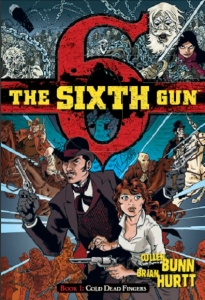 In the midst of the Civil War, General Hume was a wicked man who unleashed hell on his enemies with ease out in the Wild West. Wielding a mystical pistol that allowed him to see into the future, General Hume was regarded as a master strategist who was nearly impossible to defeat in battle. Arming his allies with five other similar pistols, each with their own unique abilities, Hume remained a powerhouse until he was unexpectedly overthrown, being killed and buried on holy ground so that it was neigh impossible for him to rise again to wreak havoc on the world. Years later, Hume’s wife, Missy, sets out resurrect her husband and put his gun back into his hands. The only problem is that an ill, old preacher has come to own the pistol, which can only be taken from a person when they are killed. Just as the preacher is about to pass the pistol down to his step daughter, Becky Montcrief, Pinkerton agents for Missy attack the Montcrief homestead and kill him. Acting quickly, Becky picks up the gun and becomes its new rightful owner, allowing herself to get captured and interrogated by Missy. Meanwhile, the mysterious Drake Sinclair is hot on Becky’s trail, attempting to gather together the six guns for his own personal agenda. With a slippery man like Drake Sinclair unknowingly on her side, Becky must fight tooth and nail beside her new ally to stop General Hume from rising again while also trying to discover the mystery surrounding these six guns.
In the midst of the Civil War, General Hume was a wicked man who unleashed hell on his enemies with ease out in the Wild West. Wielding a mystical pistol that allowed him to see into the future, General Hume was regarded as a master strategist who was nearly impossible to defeat in battle. Arming his allies with five other similar pistols, each with their own unique abilities, Hume remained a powerhouse until he was unexpectedly overthrown, being killed and buried on holy ground so that it was neigh impossible for him to rise again to wreak havoc on the world. Years later, Hume’s wife, Missy, sets out resurrect her husband and put his gun back into his hands. The only problem is that an ill, old preacher has come to own the pistol, which can only be taken from a person when they are killed. Just as the preacher is about to pass the pistol down to his step daughter, Becky Montcrief, Pinkerton agents for Missy attack the Montcrief homestead and kill him. Acting quickly, Becky picks up the gun and becomes its new rightful owner, allowing herself to get captured and interrogated by Missy. Meanwhile, the mysterious Drake Sinclair is hot on Becky’s trail, attempting to gather together the six guns for his own personal agenda. With a slippery man like Drake Sinclair unknowingly on her side, Becky must fight tooth and nail beside her new ally to stop General Hume from rising again while also trying to discover the mystery surrounding these six guns.
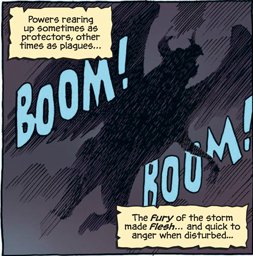 Cullen Bunn combines western with fantasy to create the addictive “The Sixth Gun”. Set shortly after the Civil War, Sixth Gun embraces its western roots but blurs the line between action, adventure, and fantasy in the meantime. A slick shootout can quickly dissolving into a battle against a mystical beast under the guidance of the sharp-witted Bunn, who seems to find something for everyone to enjoy in this story. There’s no way to dispute the western influence on the story, from the way the characters walk, talk, or dress, to the use of six shooters or shotguns and even the wacky settings, ranging from saloons to deserts, canyons to fortresses, and everything in between. The Sixth Gun is what I’d call part of the “weird western” genre that gets thrown around nowadays, referring to your typical western genre with some form of wacky twist, similar to books like Pretty Deadly or East Of West. Bunn balances the weirdness and the western out perfectly though, easily appeasing fans of both genres who might feel fearful about combining them together.
Cullen Bunn combines western with fantasy to create the addictive “The Sixth Gun”. Set shortly after the Civil War, Sixth Gun embraces its western roots but blurs the line between action, adventure, and fantasy in the meantime. A slick shootout can quickly dissolving into a battle against a mystical beast under the guidance of the sharp-witted Bunn, who seems to find something for everyone to enjoy in this story. There’s no way to dispute the western influence on the story, from the way the characters walk, talk, or dress, to the use of six shooters or shotguns and even the wacky settings, ranging from saloons to deserts, canyons to fortresses, and everything in between. The Sixth Gun is what I’d call part of the “weird western” genre that gets thrown around nowadays, referring to your typical western genre with some form of wacky twist, similar to books like Pretty Deadly or East Of West. Bunn balances the weirdness and the western out perfectly though, easily appeasing fans of both genres who might feel fearful about combining them together.
Cullen Bunn does so many things right with The Sixth Gun. Everywhere you look across this six issue collection, you just see writing done right. The first place to start has to be with the character. I’d say there’s maybe four or five primary characters with nearly double that for secondary characters. Bunn manages to find just the right amount of characterization for each character, fleshing them all out in an appropriate manner and never wasting page or panel space doing too much or too little. It’s almost as if Bunn was a chef following the measurements for the recipe for perfection and just absolutely nailed it. Your primary protagonists in Drake Sinclair and Becky Montcrief are engaging, dramatic, mysterious, and everything else you could ever ask for in lead characters. With Drake Sinclair you get an immediate sense of a hero that could easily be a villain, he’s a little bit Indiana Jones with Sawyer from Lost. You can clearly see that he might not have been a good man back in the day, but he’s clearly trying to be a good man now. It’s a facet of the character that keeps you interested in him from start to finish, as Bunn leaves enough out there for the reader to figure out on their own while also filling in the pieces of the puzzle as you go. By the time you learn more about his past, you have a complete understanding of who the character is, what he’s done, and why he did it. With Becky Montcrief, you get a bit of Dorothy from The Wizard of Oz mixed in with Princess Leia from Star Wars. She’s a woman who is integral to the larger part of the picture but doesn’t want to be in the painting. Her initial resilience is what drives her to actually come around to care about what’s going on around her. Then she inevitably ends up being one of the strongest cast members, capable of taking care of herself and not being this constant damsel in distress. If anything, Becky Montcrief is a character who, at times, appears like she is dangerous to being pigeonholed into certain character tropes only to then shuck that norm and be something different. One of the most refreshing parts of this story is that fact that Becky is strong enough on her own to trust Drake when it comes to helping him save the day but distrusting him when it comes to anything else. Not that I’m trying to spoil the story for you, but it’s such a relief to see that these two lead characters don’t end up falling in love at the end, like maybe a thousand mediocre writers might have tried to do. Cullen Bunn deserves a lot of praise for making layered lead characters who aren’t cardboard caricatures of characters we’ve seen before.
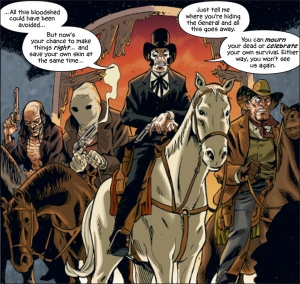 In terms of your other characters, your primary antagonists in Missy and General Hume are just as interesting due to the influence that the six guns have on them as well as the story. Missy Hume is a woman who seems dead set on resurrecting her husband (ha, what a pun) but also ends up being strong enough on her own that, when things don’t go as planned, she doesn’t immediately crumble. She’s dastardly, evil, and clearly more intelligent than she is given credit for because of how much she goes out of her way to play second fiddle to her husband. Hume is a fairly straight forward antagonist in that he just wants his gun back so that he can “rule the world” so to speak and return back to his former glory. He’s a character that is, as I said, interesting but also someone who can easily be swept away in favour of growing a larger story, something Bunn seems to be aware of. Around these antagonists, Bunn also manages to build some cool lackies for the Humes to command. The four horsemen who wield four of the six pistols are all unique characters that suit the weapon they carry, ranging from a broad shoulder powerhouse whose gun packs the power of a cannonball, to a sickly man with a bag over his head that makes your body decay with a single shot. It’s all rather “four horsemen of the Apocalypse”, a reference that isn’t lost on Bunn as he still makes these supporting villains interesting in the ways that they can affect the action in the story.
In terms of your other characters, your primary antagonists in Missy and General Hume are just as interesting due to the influence that the six guns have on them as well as the story. Missy Hume is a woman who seems dead set on resurrecting her husband (ha, what a pun) but also ends up being strong enough on her own that, when things don’t go as planned, she doesn’t immediately crumble. She’s dastardly, evil, and clearly more intelligent than she is given credit for because of how much she goes out of her way to play second fiddle to her husband. Hume is a fairly straight forward antagonist in that he just wants his gun back so that he can “rule the world” so to speak and return back to his former glory. He’s a character that is, as I said, interesting but also someone who can easily be swept away in favour of growing a larger story, something Bunn seems to be aware of. Around these antagonists, Bunn also manages to build some cool lackies for the Humes to command. The four horsemen who wield four of the six pistols are all unique characters that suit the weapon they carry, ranging from a broad shoulder powerhouse whose gun packs the power of a cannonball, to a sickly man with a bag over his head that makes your body decay with a single shot. It’s all rather “four horsemen of the Apocalypse”, a reference that isn’t lost on Bunn as he still makes these supporting villains interesting in the ways that they can affect the action in the story.
The pace of the story is a triumph in its own regard, as each and every story beat or reveal hits at the perfect time or moment. From revelations about Drake, to death-defying action sequences, or even epic showdowns years in the making, Cullen Bunn clearly knows how to structure a story arc with acts that tell their own fulfilling story while also lending to the overall narrative. Your first act of the story centres on introducing your characters, showing you who they are, what they’re after and sets them on the path for whatever they’re after. The story spins around with Becky agreeing to come along with Drake which leads into the second act that reveals more about the characters, gives you some good action beats and sets the stage for your epic finale. By the time the third act rolls around, Cullen Bunn is allowed to let everything hang loose and goes at it full throttle, lobbing mouth water action scenes with delicate character moments to give the reader a solid payoff in the end. It strikes the bell in the right way time after time and keeps going from there. It’s fantastic that this is an ongoing series that could have completely ended after this first volume and have been regarded as a wild success in the medium of comic storytelling. You’ve got a clear beginning, middle, and end, but it leaves the door open to carry on forward, which any reader should do if they enjoy the first volume as much as they should.
Collects: The Sixth Gun #1-6.
Best Character: Drake Sinclair.
Best Line Of Dialogue/Caption: “The Devil? No…but I do his business from time to time.” – Drake Sinclair.
Best Scene/Moment: The battle in the Maw – Issue 6.
Best Issue: Issue 6 is the no-brainer choice for this one. It’s a high action showdown between Hume and Sinclair, with the fate of the world hanging in the balance. The stakes are high, the character moments are exciting, and there’s plenty of moments that’ll make your heart skip a beat or make you feel sad for the tragic things that happen to certain characters. This is weird western at its finest with a strong sense of characters, action, drama, and everything else you could ever ask for from a comic book series.
Why You Should Read It: The Sixth Gun is weird western done right. Cullen Bunn makes a near perfect comic arc with this first volume as it shows you all you need to know about the characters and story while being perfectly paced out. There’s a clear three-act structure, interesting characters, snappy dialogue, beautiful artwork, and so much more that I’ll be here all day if I try to list it off. This is simply the standard for good great writing in comics. Cullen Bunn is fantastic on what is easily some of the best work of his career with The Sixth Gun.
Deadpool Kills The Marvel Universe
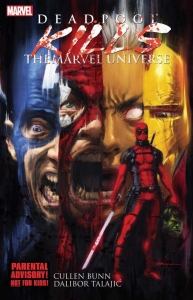 Cullen Bunn is the mastermind behind the successful “Deadpool Killogy” from Marvel Comics, stretching out a series of miniseries to create a trilogy of stories all about a more vicious side of Deadpool. Each miniseries by itself was a massive success and firmly cemented Cullen Bunn as a premier Deadpool writer for this current generation of readers. It all kicked off with today’s book, Deadpool Kills the Marvel Universe, where Deadpool brutally murders EVERY Marvel character in existence. But Cullen Bunn couldn’t stop there, as he then sent Deadpool after characters of literary significance with Deadpool Killustrated before finally turning the barrel of the gun back on the “Merc With A Mouth” himself with the aptly titled Deadpool Kills Deadpool.
Cullen Bunn is the mastermind behind the successful “Deadpool Killogy” from Marvel Comics, stretching out a series of miniseries to create a trilogy of stories all about a more vicious side of Deadpool. Each miniseries by itself was a massive success and firmly cemented Cullen Bunn as a premier Deadpool writer for this current generation of readers. It all kicked off with today’s book, Deadpool Kills the Marvel Universe, where Deadpool brutally murders EVERY Marvel character in existence. But Cullen Bunn couldn’t stop there, as he then sent Deadpool after characters of literary significance with Deadpool Killustrated before finally turning the barrel of the gun back on the “Merc With A Mouth” himself with the aptly titled Deadpool Kills Deadpool.
Deadpool has always been a character with a loose screw or two. A reckless “Merc With A Mouth”, Deadpool has never had a problem killing anyone as long as the price is right. After an odd run in with the X-Men, Charles Xavier finally decides enough is enough for Ol’DP and feels as though it’s time to finally institutionalize him. Little does Professor X realize that the doctor he leaves Deadpool in care of is actually Professor Psycho, exploiting the minds of his villainous patients to create an evil army that will help conquer the world. Professor Psycho beings his treatment of Deadpool by attacking his mind, weakening his inner voices but revealing a far more sinister one hidden deep within his psyche. This newly unlocked voice convinces Deadpool that he must kill all superheroes and super villains without prejudice, mowing down all who stand in his way. Deadpool sets off on a murderous rampage, tearing through the most powerful heroes on the face of the planet with seeming ease. But the blood lust isn’t entirely random as the sinister voice begins to guide Deadpool towards a violent endgame.
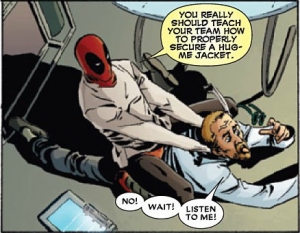 Cullen Bunn gives readers the take on Deadpool that they’ve been expecting for years with Deadpool Kills The Marvel Universe. Simply put, Bunn snaps the fragile string that is Deadpool’s psyche and sends him off on a mass superhero murder spree that would make any super villain envious…so then he decides to spread the wealth by killing all the villains as well. For all the love Deadpool gets showered with from his fans, this type of take on Deadpool is almost enough to make you entirely dislike the character, which in and of itself is a testament to Cullen Bunn’s abilities as a writer. If anything, it speaks volumes that Bunn does that good of a job casting the hero as the villain in his own story, as by the end of this mini-series you aren’t in fits of gut-busting laughter from Deadpool related comedy but instead you feel unclean because of just how inherently evil some of the things Deadpool manages to do actually are. The character still has time for a joke or two but this new, apathetic take on the character is spine tingling and disturbing, as he carries little regard for the life he takes on his quest to eliminate all types of heroes and villains.
Cullen Bunn gives readers the take on Deadpool that they’ve been expecting for years with Deadpool Kills The Marvel Universe. Simply put, Bunn snaps the fragile string that is Deadpool’s psyche and sends him off on a mass superhero murder spree that would make any super villain envious…so then he decides to spread the wealth by killing all the villains as well. For all the love Deadpool gets showered with from his fans, this type of take on Deadpool is almost enough to make you entirely dislike the character, which in and of itself is a testament to Cullen Bunn’s abilities as a writer. If anything, it speaks volumes that Bunn does that good of a job casting the hero as the villain in his own story, as by the end of this mini-series you aren’t in fits of gut-busting laughter from Deadpool related comedy but instead you feel unclean because of just how inherently evil some of the things Deadpool manages to do actually are. The character still has time for a joke or two but this new, apathetic take on the character is spine tingling and disturbing, as he carries little regard for the life he takes on his quest to eliminate all types of heroes and villains.
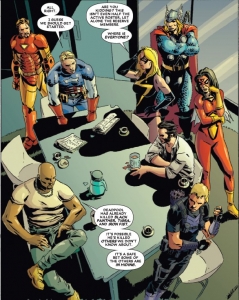 While the murder-frenzied Deadpool is one of the runaway best parts of this book, another part that gives it a run for its money is the way in which Deadpool doles out the carnage he sows. It’s one thing for a character like Deadpool to just shoot a character and be done with it, (something we’ve seen him do countless times) it’s another thing entirely though to have the character actually show us how he’d take care of nearly all the members of the Avengers in a single blow, or how he’d pick off mentally weak heroes and villains. You’d think that some of Marvel’s strongest and greatest characters like Spider-Man, Thor, or even Hulk would easily dismantle Deadpool in a fight and in most instances you’d be right. The monumental difference in his fights against these characters though is that Deadpool is playing to the death, where some of these characters aren’t willing to cross that line. Even when a heavy hitter like Hulk steps up and seemingly does what he needs to, Deadpool’s impervious nature to death keeps him bouncing back and allows him to handle these big guns with general ease. It’s some brilliant work by Bunn as he shows us how easily Deadpool could take care of the entire Marvel Universe, never seemingly challenged by anyone or anything that stands in his way throughout the story.
While the murder-frenzied Deadpool is one of the runaway best parts of this book, another part that gives it a run for its money is the way in which Deadpool doles out the carnage he sows. It’s one thing for a character like Deadpool to just shoot a character and be done with it, (something we’ve seen him do countless times) it’s another thing entirely though to have the character actually show us how he’d take care of nearly all the members of the Avengers in a single blow, or how he’d pick off mentally weak heroes and villains. You’d think that some of Marvel’s strongest and greatest characters like Spider-Man, Thor, or even Hulk would easily dismantle Deadpool in a fight and in most instances you’d be right. The monumental difference in his fights against these characters though is that Deadpool is playing to the death, where some of these characters aren’t willing to cross that line. Even when a heavy hitter like Hulk steps up and seemingly does what he needs to, Deadpool’s impervious nature to death keeps him bouncing back and allows him to handle these big guns with general ease. It’s some brilliant work by Bunn as he shows us how easily Deadpool could take care of the entire Marvel Universe, never seemingly challenged by anyone or anything that stands in his way throughout the story.
As I just stated, Deadpool has little trouble dealing with the entire Marvel Universe in this series, which is actually wherein the problem in this story lies; the character is never challenged, he just aimlessly destroys. Bunn tries to give Deadpool a focused adversary at around the halfway mark of the story in hopes of creating some sense of dramatic flare in between the entertaining moments of Deadpool dismantling everyone in his way. The unfortunate truth is that by the time this character catches up with Deadpool even they hardly last more than a few fleeting moments before Deadpool moves along to the next obstacle. The whole point of the series is that Deadpool is trying to kill the Marvel Universe and it’s something he does highly effectively, but he ends up being so good at it that at times it almost becomes boring as no one enjoys a juggernaut character that never faces any true conflict on the quest towards their goal. One of the redeeming qualities of this plot though is the brilliant ending by Cullen Bunn, as he scripts the perfect concluding moments for a story like this one. It’s a moment that suits the character of Deadpool in a classic manner, will easily have you laughing but also mildly disturbed, and just reads with such fluidity that it absolutely accomplishes what it strived to do.
Collects: Deadpool Kills The Marvel Universe #1-4.
Best Character: Deadpool.
Best Line Of Dialogue/Caption: “You know what all those “better psychopaths” you were bragging about shoulda tried? A gun.” – Deadpool.
Best Scene/Moment: The ending – Issue 4.
Best Issue: Issue 4. Issue 4 comes off as an enjoyable issue because of how it handles the last vestiges of the Marvel Universe’s heroes and villains. Deadpool has devised a pretty brilliant way to handle these remaining foes although the Punisher might have a thing or two to say about that. The showdown between Deadpool and the Punisher is as poignant in its brief nature as it is brutal and is sure to make you think Deadpool has yet again gone too far. After all that is said and done you get the showdown with the character who has been trailing Deadpool for the bulk of the story before getting the best possible ending to this series that you could hope for. Seriously, the ending is perfection.
Why You Should Read It: This mini-series is reason enough to look to Cullen Bunn as one of the best writers for Deadpool in the last few years. He handles the character’s usual stature quite well early on before shifting gears to give readers a different side of Deadpool. Bunn also shows that the character is kind of genius in a sick, weird, and twisted way. This isn’t serious reading material whatsoever but tons of fun if you’re looking for an over-the-top, violent, disturbing Deadpool story that isn’t your run of the mill superhero hack-n’-slash type of outing.

